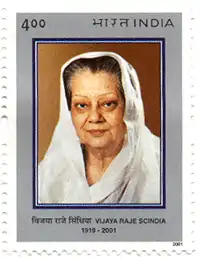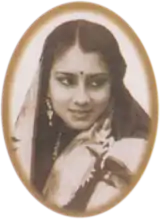Vijaya Raje Scindia
Vijaya Raje Scindia (12 October 1919 – 25 January 2001), born Lekha Divyeshwari Devi and known popularly as the Rajmata of Gwalior, was a prominent Indian political personality. In the days of the British Raj, as consort of the last ruling Maharaja of Gwalior, Jivajirao Scindia, she ranked among the highest royal figures of the land. In later life, she became a politician of considerable influence and was elected repeatedly to both houses of the Indian parliament. She was also an active member, for many decades, of the Jana Sangh and co-founder of Bharatiya Janata Party.
| Vijaya Raje Scindia | |||||
|---|---|---|---|---|---|
| Rajmata of Gwalior | |||||
 | |||||
| Rajmata of Gwalior | |||||
| Tenure | 1970−1998 | ||||
| Born | 12 October 1919 Sagar, Central Provinces and Berar, British Raj | ||||
| Died | 25 January 2001 (aged 81) New Delhi, India | ||||
| Spouse | HH Maharaja Jivajirao Scindia | ||||
| |||||
| House | Gwalior, India | ||||
| Father | Thakur Mahendra Singh | ||||
| Mother | Chuda Devashwari Devi | ||||
| Religion | Hinduism | ||||
Early years

Vijaya Raje Scindia was born in 1919 at Sagar in present-day Madhya Pradesh, the eldest child of Thakur Mahendra Singh of kotla state (U.P.), a government officer, by his second wife, Chuda Devashwari Devi. She was named Lekha Divyeshwari Devi at birth. Her father was a deputy collector in the provincial administration. Her mother was the daughter of former Commander-in-chief of the Nepalese Army Commanding-General Raja Khadga Shamsher Jang Bahadur Rana, the nephew of founder of Rana dynasty of Nepal, Jang Bahadur Kunwar Rana. She died at Vijaya Raje's birth. Her brother is Dhyanendra Singh, husband of Maya Singh.[1]
Lekha's maternal grandfather, Khadga Shumsher Jang Bahadur Rana, had been exiled to India and had taken up residence at Sagar. It was in Sagar that Lekha was born. Her mother's death meant that Lekha never lived with her father: she was raised in the household of her maternal grandparents. The young Lekha was deeply influenced by her grandmother, Rani Dhan Kumari, an exceedingly pious lady of orthodox disposition. The impress of this early influence was to leave a lasting impact on Lekha's personality.
Her family was aristocratic and had royal lineage but they were exiled. To this circumstance may be attributed the fact that Lekha received a relatively normal upbringing and a standard education, suitable to modernizing, upwardly mobile families rather than aristocratic ones. She was educated at home initially, later studying at both the Vasanta College, Benares, and the Isabella Thoburn College, Lucknow. She stayed at a ladies hostel during this period and lived largely as other students did. During this period, the Indian independence movement was at it peak. Already drawn towards austerity by the influence of her grandmother, Lekha gave up the use of foreign goods and fabrics.
Personal life
In February 1941,[2] at the age of 22, Lekha was married to Jivajirao Scindia, Maharaja of Gwalior, one of the largest, richest and highest-ranking 21-gun-salute princely states in India. As per tradition, a new name was chosen for Lekha based upon the matching of the couple's horoscopes, and she assumed the name 'Vijayaraje Scindia'.
Children
Vijaya Raje and Jivajirao had four daughters and a son:
- Padmavati Raje 'Akkasaheb' Burman (1942–64), who wed Kirit Bikram Kishore Deb Barman, last ruling Maharaja of Tripura.
- Usha Raje Rana (b. 1943), who wed her distant cousin, Pashupati Shamsher Jang Bahadur Rana, a Nepali politician belonging to the Rana dynasty. They are the parents of Devyani Rana and Urvashi Rana; see Nepalese royal massacre.
- Madhavrao Scindia (1945–2001), Indian politician belonging to the Indian National Congress and former Union Minister of Railways, Aviation and Human resources development, and the titular Maharaja of Gwalior. He is the father of Jyotiraditya Scindia.
- Vasundhara Raje (b. 1953) BJP politician and a two-term Chief Minister of Rajasthan. She was formerly married to the titular Maharaja of Dholpur.
- Yashodhara Raje (b. 1954) BJP politician. She was formerly married to Dr. Siddharth Bhansali, a US-based cardiologist.
Family life
Vijaya Raje's relationship with her husband and its confirmed, by every account, to the Indian ideal of perfect harmony; this is easy enough to believe, as Vijayaraje, the supreme traditionalist, would have deemed it her duty to defer to him, and to family elders, on all matters.
The situation was in every sense reversed where her children were concerned. The demise of Jivajirao in 1961 left Vijayaraje the only parent for her growing children. True to her character, Vijayaraje proved an exacting and somewhat martinet parent; she expected her children to meet her own idealised standards of lifestyle and behaviour. This did not make for particular warmth, and in later life, Vijayaraje's relationship with her adult children wavered between the formally cordial and the antagonistic. In her autobiography, she regretfully recounts how little sympathy she was able to extend to her two younger daughters in their troubled marriages, and wonders whether her husband may not have handled those situations better.
Her relationship with her only son was especially troubled; personal problems were exacerbated by political differences, and she sometimes felt moved to attack his character in public. Indeed, when her will was read shortly after her death, it was found that she had forbidden her son from participating in her funerary obsequies. This is the ultimate castigation an orthodox Hindu can mete out to a son. Her children have occasionally attributed these family differences to the baneful influence of Vijayaraje's advisers, but most observers disagree with this assessment.
Politics

Vijayaraje was initiated into electoral politics in 1957 when she contested and won the Guna Lok Sabha seat in Madhya Pradesh on a Congress ticket. Five years later, she won on a Congress ticket from Gwalior. Later, she quit the Congress and won the Guna seat in 1967 on Swatantra Party's ticket. She soon joined Bharatiya Jan Sangh and resigned from Lok Sabha to take part in state politics. She won the Karera assembly seat in Madhya Pradesh as the Jan Sangh candidate in 1967 and plunged headlong into state politics. Jan Sangh defied the Indira-wave in the 1971 Lok Sabha polls to win 3 seats in Gwalior region - Vijaya Raje Scindia from Bhind, Vajpayee from Gwalior and Madhavrao Scindia from Guna, though he later left the party. Vijayaraje Scindia did not contest Lok Sabha elections in 1977 and 1984 and lost to Indira Gandhi in Rae Bareli in 1980. In 1989, she won from Guna as member of Bharatiya Janata Party (BJP), and retained the seat in 1991, 1996 and 1998. She did not contest the elections in 1999 due to old age. She was jailed by Indira Gandhi during the Emergency, ultimately sharing a cell with fellow Rajmata and MP, Gayatri Devi, in Tihar Jail. In the 1970s, Vijayraje and her son Madhavrao were involved in a public dispute over property. Animosities heightened due to their differing political ideologies.
Vijayaraje came to the forefront of the BJP leadership in 1980 when she was made one of its vice-presidents. She played a key role in popularizing the party's Ram Janmabhoomi movement and was considered a hardliner. Following the demolition of the Babri Masjid in December 1992, she had declared that "she could now die without any regret, for she had seen her dream come true."[3] She remained a BJP vice-president until 1998 when she stepped down on health grounds and quit electoral politics. She died in January 2001.
In media
In the late 1980s, Vijaya Raje penned an autobiography with major assistance from the noted author Manohar Malgonkar. The book entitled The last Maharani of Gwalior, proved a best-seller. It provides many valuable details of her life and career, but ends with the general elections of 1984. A biography of Vijaya Raje Scindia in the Hindi language has been written by the writer Mridula Sinha, titled Ek Thi Rani Aisi Bhi (there was such a Queen too). A film of the same name, starring Hema Malini and based on this latter book, was released in 2017.
Apart from biographies, much has been written in the press and by other writers with the Rajmata as the subject. For instance, William Dalrymple devotes a chapter of his collection of travel memoirs, The Age of Kali, to the Rajmata.
Ancestry
| Ancestors of Vijaya Raje Scindia | ||||||||||||||||||||||||||||||||||||||||||||||||||||||||||||||||||||||||||||||||||||||||||||||||||||||||||||||||||||||||||||||||||||||||||||||||||||||||||||||||||||||||||||||||||||||||||||||||||||||||||||||||||||||||||||||||||||||||||||||||||||||||||||||||||||||||||||||||||||||||||||||||||||||||||||||||||||||||||||||||||||||||||||||||||||||||||||||||||||||||||||||||||||||||||||||||||||||||||||||||||||||||||||||||||||||||||||||||||||||||||||||||||||||||||||||||||||||||||||||||||||||||||
|---|---|---|---|---|---|---|---|---|---|---|---|---|---|---|---|---|---|---|---|---|---|---|---|---|---|---|---|---|---|---|---|---|---|---|---|---|---|---|---|---|---|---|---|---|---|---|---|---|---|---|---|---|---|---|---|---|---|---|---|---|---|---|---|---|---|---|---|---|---|---|---|---|---|---|---|---|---|---|---|---|---|---|---|---|---|---|---|---|---|---|---|---|---|---|---|---|---|---|---|---|---|---|---|---|---|---|---|---|---|---|---|---|---|---|---|---|---|---|---|---|---|---|---|---|---|---|---|---|---|---|---|---|---|---|---|---|---|---|---|---|---|---|---|---|---|---|---|---|---|---|---|---|---|---|---|---|---|---|---|---|---|---|---|---|---|---|---|---|---|---|---|---|---|---|---|---|---|---|---|---|---|---|---|---|---|---|---|---|---|---|---|---|---|---|---|---|---|---|---|---|---|---|---|---|---|---|---|---|---|---|---|---|---|---|---|---|---|---|---|---|---|---|---|---|---|---|---|---|---|---|---|---|---|---|---|---|---|---|---|---|---|---|---|---|---|---|---|---|---|---|---|---|---|---|---|---|---|---|---|---|---|---|---|---|---|---|---|---|---|---|---|---|---|---|---|---|---|---|---|---|---|---|---|---|---|---|---|---|---|---|---|---|---|---|---|---|---|---|---|---|---|---|---|---|---|---|---|---|---|---|---|---|---|---|---|---|---|---|---|---|---|---|---|---|---|---|---|---|---|---|---|---|---|---|---|---|---|---|---|---|---|---|---|---|---|---|---|---|---|---|---|---|---|---|---|---|---|---|---|---|---|---|---|---|---|---|---|---|---|---|---|---|---|---|---|---|---|---|---|---|---|---|---|---|---|---|---|---|---|---|---|---|---|---|---|---|---|---|---|---|---|---|---|---|---|---|---|---|---|---|---|---|---|---|---|---|---|---|---|---|---|---|---|---|---|---|---|---|---|---|---|---|---|---|---|---|---|---|---|---|---|---|---|---|---|---|---|---|---|---|---|---|---|---|---|---|---|---|---|---|---|---|---|---|---|---|---|---|---|---|---|---|---|---|---|---|---|---|---|---|---|---|---|---|---|---|---|---|---|---|
| ||||||||||||||||||||||||||||||||||||||||||||||||||||||||||||||||||||||||||||||||||||||||||||||||||||||||||||||||||||||||||||||||||||||||||||||||||||||||||||||||||||||||||||||||||||||||||||||||||||||||||||||||||||||||||||||||||||||||||||||||||||||||||||||||||||||||||||||||||||||||||||||||||||||||||||||||||||||||||||||||||||||||||||||||||||||||||||||||||||||||||||||||||||||||||||||||||||||||||||||||||||||||||||||||||||||||||||||||||||||||||||||||||||||||||||||||||||||||||||||||||||||||||
References
- "The Theory Of Relativity". Outlook India. 30 November 1998. Archived from the original on 9 February 2011.
- Reed, Stanley (1950). The Indian And Pakistan Year Book And Who's Who 1950. Bennett Coleman and Co. Ltd. p. 684. Retrieved 22 February 2018.
- "December 6, 1992, a memoir". Rediff.com. 5 December 1997. Retrieved 2 November 2018.
Further reading
| Wikimedia Commons has media related to Vijaya Raje Scindia. |
- Scindia, Vijayaraje, with Malgonkar, Manohar. The Last Maharani of Gwalior: An Autobiography, State University of New York Press, Albany (1987).
- Brief biography
- From the Tribune newspaper